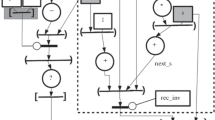Abstract
Operator precedence languages (OPL) enjoy the local parsability property, which essentially means that a code fragment enclosed within a pair of markers—playing the role of parentheses—can be compiled with no knowledge of its external context. Such a property has been exploited to build parallel compilers for languages formalized as OPLs. It has been observed, however, that when the syntax trees of the sentences have a linear substructure, its parsing must necessarily proceed sequentially making it impossible to split such a subtree into chunks to be processed in parallel. Such an inconvenience is due to the fact that so far much literature on OPLs has assumed the hypothesis that the equality precedence relation cannot be cyclic. We present an enriched version of operator precedence grammars which allows to remove the above hypothesis, therefore providing a little more expressive generality, and to further optimize parallel compilation.
The extended version of this paper, available in [6], contains an omitted correctness proof, explanatory examples and figures developed in more depth.
Access this chapter
Tax calculation will be finalised at checkout
Purchases are for personal use only
Similar content being viewed by others
Notes
- 1.
The above procedure that led to the syntax tree of Fig. 2 could be easily adapted to become an algorithm that produces a new syntax tree whose internal nodes are labeled by \(G_{AE}\)’s nonterminals. Such an algorithm could be made deterministic by transforming \(G_{AE}\) into a structurally equivalent BD grammar sharing the same OPM [2, 12].
- 2.
The language \(\{a^n(bc)^n\} \cup \{b^n(ca)^n\} \cup \{c^n(ab)^n\} \cup (abc)^+\) cannot be generated by an OPG because the \(a\doteq b \doteq c \doteq a\) relations are necessary [9], but it is accepted by OPAs.
- 3.
For our purposes \(^+\) is more convenient than \(^*\) without affecting the generality.
- 4.
Any nondeterministic OPA can be transformed into a deterministic one at the cost of quadratic exponential increase in the size of the state space [15].
References
Alur, R., Madhusudan, P.: Adding nesting structure to words. J. ACM 56(3) (2009). https://doi.org/10.1145/1516512.1516518
Autebert, J., Berstel, J., Boasson, L.: Context-free languages and pushdown automata. In: Handbook of Formal Languages, no. 1, pp. 111–174 (1997). https://doi.org/10.1007/978-3-642-59136-5_3
Barenghi, A., Crespi Reghizzi, S., Mandrioli, D., Panella, F., Pradella, M.: Parallel parsing made practical. Sci. Comput. Program. 112(3), 195–226 (2015). https://doi.org/10.1016/j.scico.2015.09.002
Barenghi, A., Crespi Reghizzi, S., Mandrioli, D., Pradella, M.: Parallel parsing of operator precedence grammars. Inf. Process. Lett. 113(7), 245–249 (2013). https://doi.org/10.1016/j.ipl.2013.01.008
Chiari, M., Mandrioli, D., Pontiggia, F., Pradella, M.: A model checker for operator precedence languages. ACM Trans. Program. Lang. Syst. 45(3), 19:1–19:66 (2023). https://doi.org/10.1145/3608443
Chiari, M., Mandrioli, D., Pradella, M.: Cyclic operator precedence grammars for parallel parsing. CoRR arxiv:2309.04200 (2023)
Crespi Reghizzi, S., Mandrioli, D.: Operator precedence and the visibly pushdown property. J. Comput. Syst. Sci. 78(6), 1837–1867 (2012). https://doi.org/10.1016/j.jcss.2011.12.006
Crespi Reghizzi, S., Mandrioli, D., Martin, D.F.: Algebraic properties of operator precedence languages. Inf. Control 37(2), 115–133 (1978)
Crespi Reghizzi, S., Pradella, M.: Beyond operator-precedence grammars and languages. J. Comput. Syst. Sci. 113, 18–41 (2020). https://doi.org/10.1016/j.jcss.2020.04.006
Floyd, R.W.: Syntactic analysis and operator precedence. J. ACM 10(3), 316–333 (1963)
Grune, D., Jacobs, C.J.: Parsing Techniques: A Practical Guide. Springer, New York (2008). https://doi.org/10.1007/978-0-387-68954-8
Harrison, M.A.: Introduction to Formal Language Theory. Addison Wesley, Boston (1978)
Henzinger, T.A., Kebis, P., Mazzocchi, N., Saraç, N.E.: Regular methods for operator precedence languages. In: Etessami, K., Feige, U., Puppis, G. (eds.) 50th International Colloquium on Automata, Languages, and Programming, ICALP 2023, Paderborn, Germany, 10–14 July 2023. LIPIcs, vol. 261, pp. 129:1–129:20. Schloss Dagstuhl - Leibniz-Zentrum für Informatik (2023). https://doi.org/10.4230/LIPIcs.ICALP.2023.129
Li, L., Taura, K.: Associative operator precedence parsing: a method to increase data parsing parallelism. In: Proceedings of the International Conference on High Performance Computing in Asia-Pacific Region, HPC Asia 2023, Singapore, 27 February–2 March 2023, pp. 75–87. ACM (2023).https://doi.org/10.1145/3578178.3578233
Lonati, V., Mandrioli, D., Panella, F., Pradella, M.: Operator precedence languages: their automata-theoretic and logic characterization. SIAM J. Comput. 44(4), 1026–1088 (2015). https://doi.org/10.1137/140978818
Mandrioli, D., Pradella, M.: Generalizing input-driven languages: theoretical and practical benefits. Comput. Sci. Rev. 27, 61–87 (2018). https://doi.org/10.1016/j.cosrev.2017.12.001
Mandrioli, D., Pradella, M., Crespi Reghizzi, S.: Aperiodicity, star-freeness, and first-order definability of structured context-free languages. Logical Methods Comput. Sci. 19 (2023).https://doi.org/10.46298/lmcs-19(4:12)2023
McNaughton, R., Papert, S.: Counter-Free Automata. MIT Press, Cambridge (1971)
Salomaa, A.K.: Formal Languages. Academic Press, New York (1973)
Acknowledgments
This work was partially funded by the EU Commission in the Horizon Europe research and innovation programme under grant agreement No. 101107303 (MSCA-PF CORPORA).
Author information
Authors and Affiliations
Corresponding author
Editor information
Editors and Affiliations
Rights and permissions
Copyright information
© 2024 The Author(s), under exclusive license to Springer Nature Switzerland AG
About this paper
Cite this paper
Chiari, M., Mandrioli, D., Pradella, M. (2024). Cyclic Operator Precedence Grammars for Improved Parallel Parsing. In: Day, J.D., Manea, F. (eds) Developments in Language Theory. DLT 2024. Lecture Notes in Computer Science, vol 14791. Springer, Cham. https://doi.org/10.1007/978-3-031-66159-4_8
Download citation
DOI: https://doi.org/10.1007/978-3-031-66159-4_8
Published:
Publisher Name: Springer, Cham
Print ISBN: 978-3-031-66158-7
Online ISBN: 978-3-031-66159-4
eBook Packages: Computer ScienceComputer Science (R0)




